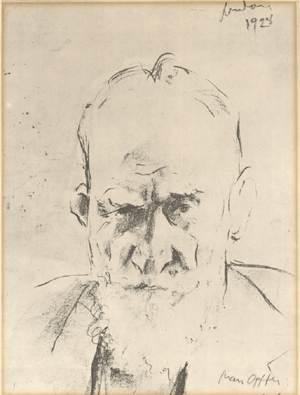Cold-Blooded Heroism

George Bernard Shaw, by Ivan Opffer
London 1928
Image courtesy of the Opffer family
Original sepia: National Museum of Ireland
In the play, Shaw exploits the same melodramatic devices he railed against in countless theater reviews, but with a twist. Shaw had long wanted to "correct" Victorian staged versions of the final scene of A Tale of Two Cities, which were typically played to emphasize that Sydney Carlton's noble sacrifice was inspired by love. The first scene Shaw penned of The Devil's Disciple involved a hero's arrest, but to different ends.
Richard Dudgeon desires his heroine but can't reveal it to her, for she is married to a man he respects. However, unlike Carlton, he sacrifices himself not out of that passion, but out of higher motives he can't explain even to himself, as prior to the moment of truth, he had sworn off God, and declared himself "the devil's disciple."
By the end of the play Dudgeon is declared a virtual saint by a former minister for his heroism, and asked to take over the pulpit, conjuring an image of a new Shavian church in which reasonable men guide women past the perils of self-denial and sentimentality.
Shaw's wit breaks through the "adventures and sighings" of the melodrama with comic subplots of mistaken character identity. Archetypical roles at the start of the play quickly become Shavian morality tales, reflecting much of the author's intellectual and emotional life at the time: his cold relationship with his mother and late reckoning with his father's death, his infatuation with other men's wives, Wagner's anti-heros, and Ibsen.
The finished work flopped in a London play reading early in 1897, but later in the year was taken up by an American producer and had a profitable season in the states, providing Shaw with enough income at the age of 40 to allow him to give up theatrical criticism and devote himself to his greatest loves: playwrighting and politics, and enabling, somewhat lower in his personal hierarchy, a highly unconventional "happy accident" of marriage.
The Devil's Disciple was later published in England in the definitive collection, Three Plays for Puritans.